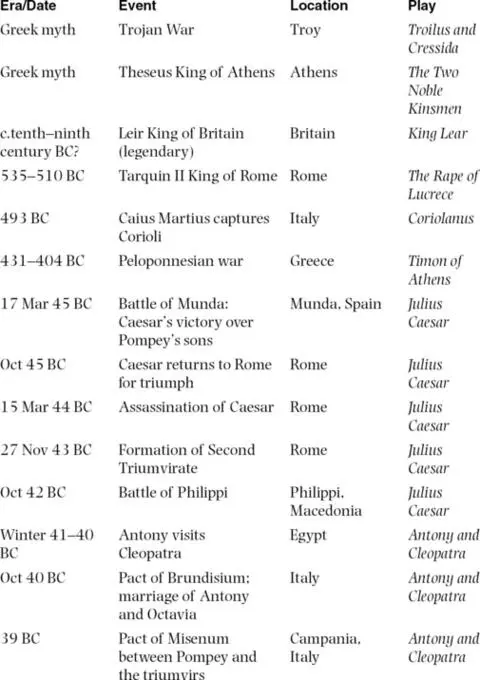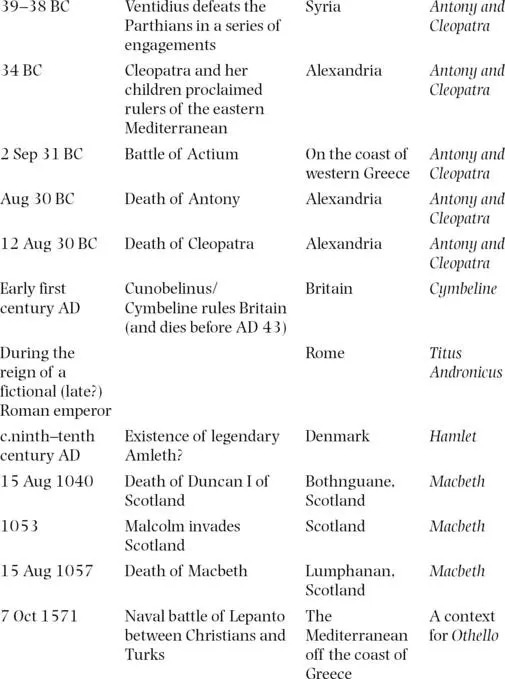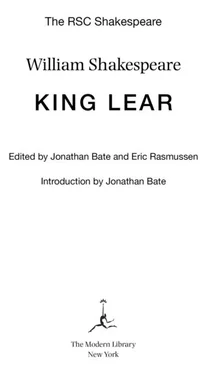уильям шекспир - King Lear
Здесь есть возможность читать онлайн «уильям шекспир - King Lear» весь текст электронной книги совершенно бесплатно (целиком полную версию без сокращений). В некоторых случаях можно слушать аудио, скачать через торрент в формате fb2 и присутствует краткое содержание. Год выпуска: 2011, ISBN: 2011, Издательство: Random House Publishing Group, Жанр: Старинная литература, на английском языке. Описание произведения, (предисловие) а так же отзывы посетителей доступны на портале библиотеки ЛибКат.
- Название:King Lear
- Автор:
- Издательство:Random House Publishing Group
- Жанр:
- Год:2011
- ISBN:978-1-58836-828-7
- Рейтинг книги:3 / 5. Голосов: 1
-
Избранное:Добавить в избранное
- Отзывы:
-
Ваша оценка:
- 60
- 1
- 2
- 3
- 4
- 5
King Lear: краткое содержание, описание и аннотация
Предлагаем к чтению аннотацию, описание, краткое содержание или предисловие (зависит от того, что написал сам автор книги «King Lear»). Если вы не нашли необходимую информацию о книге — напишите в комментариях, мы постараемся отыскать её.
King Lear — читать онлайн бесплатно полную книгу (весь текст) целиком
Ниже представлен текст книги, разбитый по страницам. Система сохранения места последней прочитанной страницы, позволяет с удобством читать онлайн бесплатно книгу «King Lear», без необходимости каждый раз заново искать на чём Вы остановились. Поставьте закладку, и сможете в любой момент перейти на страницу, на которой закончили чтение.
Интервал:
Закладка:
The collaborations with Fletcher suggest that Shakespeare’s career ended with a slow fade rather than the sudden retirement supposed by the nineteenth-century Romantic critics who read Prospero’s epilogue to The Tempest as Shakespeare’s personal farewell to his art. In the last few years of his life Shakespeare certainly spent more of his time in Stratford-upon-Avon, where he became further involved in property dealing and litigation. But his London life also continued. In 1613 he made his first major London property purchase: a freehold house in the Blackfriars district, close to his company’s indoor theater. The Two Noble Kinsmen may have been written as late as 1614, and Shakespeare was in London on business a little more than a year before he died of an unknown cause at home in Stratford-upon-Avon in 1616, probably on his fifty-second birthday.
About half the sum of his works were published in his lifetime, in texts of variable quality. A few years after his death, his fellow actors began putting together an authorized edition of his complete Comedies, Histories and Tragedies . It appeared in 1623, in large “Folio” format. This collection of thirty-six plays gave Shakespeare his immortality. In the words of his fellow dramatist Ben Jonson, who contributed two poems of praise at the start of the Folio, the body of his work made him “a monument without a tomb”:
And art alive still while thy book doth live
And we have wits to read and praise to give …
He was not of an age, but for all time!
SHAKESPEARE’S WORKS:
A CHRONOLOGY
1589–91
? Arden of Faversham (possible part authorship)
1589–92
The Taming of the Shrew
1589–92
? Edward the Third (possible part authorship)
1591
The Second Part of Henry the Sixth , originally called The First Part of the Contention betwixt the Two Famous Houses of York and Lancaster (element of coauthorship possible)
1591
The Third Part of Henry the Sixth , originally called The True Tragedy of Richard Duke of York (element of coauthorship probable)
1591–92
The Two Gentlemen of Verona
1591–92; perhaps revised 1594
The Lamentable Tragedy of Titus Andronicus (probably co-written with, or revising an earlier version by, George Peele)
1592
The First Part of Henry the Sixth , probably with Thomas Nashe and others
1592/94
King Richard the Third
1593
Venus and Adonis (poem)
1593–94
The Rape of Lucrece (poem)
1593–1608
Sonnets (154 poems, published 1609 with A Lover’s Complaint , a poem of disputed authorship)
1592–94/1600–03
Sir Thomas More (a single scene for a play originally by Anthony Munday, with other revisions by Henry Chettle, Thomas Dekker, and Thomas Heywood)
1594
The Comedy of Errors
1595
Love’s Labour’s Lost
1595–97
Love’s Labour’s Won (a lost play, unless the original title for another comedy)
1595–96
A Midsummer Night’s Dream
1595–96
The Tragedy of Romeo and Juliet
1595–96
King Richard the Second
1595–97
The Life and Death of King John (possibly earlier)
1596–97
The Merchant of Venice
1596–97
The First Part of Henry the Fourth
1597–98
The Second Part of Henry the Fourth
1598
Much Ado About Nothing
1598–99
The Passionate Pilgrim (20 poems, some not by Shakespeare)
1599
The Life of Henry the Fifth
1599
“To the Queen” (epilogue for a court performance)
1599
As You Like It
1599
The Tragedy of Julius Caesar
1600–01
The Tragedy of Hamlet, Prince of Denmark (perhaps revising an earlier version)
1600–01
The Merry Wives of Windsor (perhaps revising version of 1597–99)
1601
“Let the Bird of Loudest Lay” (poem, known since 1807 as “The Phoenix and Turtle” [turtledove])
1601
Twelfth Night, or What You Will
1601–02
The Tragedy of Troilus and Cressida
1604
The Tragedy of Othello, the Moor of Venice
1604
Measure for Measure
1605
All’s Well That Ends Well
1605
The Life of Timon of Athens , with Thomas Middleton
1605–06
The Tragedy of King Lear
1605–08
? contribution to The Four Plays in One (lost, except for A Yorkshire Tragedy , mostly by Thomas Middleton)
1606
The Tragedy of Macbeth (surviving text has additional scenes by Thomas Middleton)
1606–07
The Tragedy of Antony and Cleopatra
1608
The Tragedy of Coriolanus
1608
Pericles, Prince of Tyre , with George Wilkins
1610
The Tragedy of Cymbeline
1611
The Winter’s Tale
1611
The Tempest
1612–13
Cardenio , with John Fletcher (survives only in later adaptation called Double Falsehood by Lewis Theobald)
1613
Henry VIII (All Is True) , with John Fletcher
1613–14
The Two Noble Kinsmen , with John Fletcher
THE HISTORY BEHIND THE
TRAGEDIES: A CHRONOLOGY


FURTHER READING
AND VIEWING
CRITICAL APPROACHES
Booth, Stephen, King Lear, Macbeth, Indefinition and Tragedy (1983). Not for beginners, but very penetrating.
Bradley, A. C., Shakespearean Tragedy (1904). Still worth reading a century after publication.
Cavell, Stanley, “The Avoidance of Love,” in Disowning Knowledge in Seven Plays of Shakespeare (1987). A skeptical philosopher’s reading; still less for beginners, but so full of deep insight that it has claims to be among the best pieces ever written on the play.
Colie, Rosalie L., and F. T. Flahiff, Some Facets of “King Lear”: Essays in Prismatic Criticism (1974). An unusually strong collection of critical essays.
Danby, J. F., Shakespeare’s Doctrine of Nature (1949). Contexts for Edmund.
Dollimore, Jonathan, “King Lear and Essentialist Humanism,” in Radical Tragedy: Religion, Ideology and Power in the Drama of Shakespeare and His Contemporaries (1984). Inflected by neo-Marxist cultural politics.
Elton, William R., King Lear and the Gods (1966). Useful contextualization in the intellectual history of Shakespeare’s time.
Empson, William, “Fool in Lear,” in The Structure of Complex Words (1951). Superb essay on a key word.
Goldberg, S. L., An Essay on King Lear (1974). Consistently thoughtful.
Greenblatt, Stephen, “Shakespeare and the Exorcists,” in Shakespeare Negotiations: The Circulation of Social Energy in Renaissance England (1988). Inventive account of why Shakespeare used an anti-Popish treatise for the mad language of Poor Tom.
Heilman, R. B., This Great Stage: Image and Structure in King Lear (1963). Good account of image patterns.
Читать дальшеИнтервал:
Закладка:
Похожие книги на «King Lear»
Представляем Вашему вниманию похожие книги на «King Lear» списком для выбора. Мы отобрали схожую по названию и смыслу литературу в надежде предоставить читателям больше вариантов отыскать новые, интересные, ещё непрочитанные произведения.
Обсуждение, отзывы о книге «King Lear» и просто собственные мнения читателей. Оставьте ваши комментарии, напишите, что Вы думаете о произведении, его смысле или главных героях. Укажите что конкретно понравилось, а что нет, и почему Вы так считаете.












